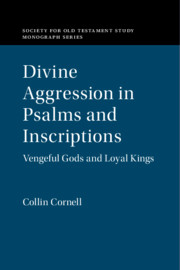8 results

Divine Aggression in Psalms and Inscriptions
- Vengeful Gods and Loyal Kings
-
- Published online:
- 16 October 2020
- Print publication:
- 15 October 2020
6 - Conclusions and Implications
-
- Book:
- Divine Aggression in Psalms and Inscriptions
- Published online:
- 16 October 2020
- Print publication:
- 15 October 2020, pp 200-214
-
- Chapter
- Export citation
7 - Conclusion
-
- Book:
- Cognitive Science and Ancient Israelite Religion
- Published online:
- 17 September 2020
- Print publication:
- 08 October 2020, pp 257-262
-
- Chapter
- Export citation
1 - Intuitive and Reflective Cognition, Optimal and Costly Religion
-
- Book:
- Cognitive Science and Ancient Israelite Religion
- Published online:
- 17 September 2020
- Print publication:
- 08 October 2020, pp 1-28
-
- Chapter
- Export citation
2 - Rethinking the Popular–Official Religion Dichotomy
-
- Book:
- Cognitive Science and Ancient Israelite Religion
- Published online:
- 17 September 2020
- Print publication:
- 08 October 2020, pp 29-63
-
- Chapter
- Export citation
3 - Revivification of the Dead as National Deliverance
-
- Book:
- The Origins of Isaiah 24–27
- Published online:
- 11 June 2019
- Print publication:
- 27 June 2019, pp 68-94
-
- Chapter
- Export citation
A Sharp Break: Childs, Wellhausen, and Theo-referentiality
-
- Journal:
- Harvard Theological Review / Volume 112 / Issue 2 / April 2019
- Published online by Cambridge University Press:
- 15 April 2019, pp. 135-159
- Print publication:
- April 2019
-
- Article
- Export citation
23 - The Bible in Asia
- from Part III - Reception of the Bible Geographically
-
-
- Book:
- The New Cambridge History of the Bible
- Published online:
- 09 June 2015
- Print publication:
- 13 April 2015, pp 461-496
-
- Chapter
- Export citation

